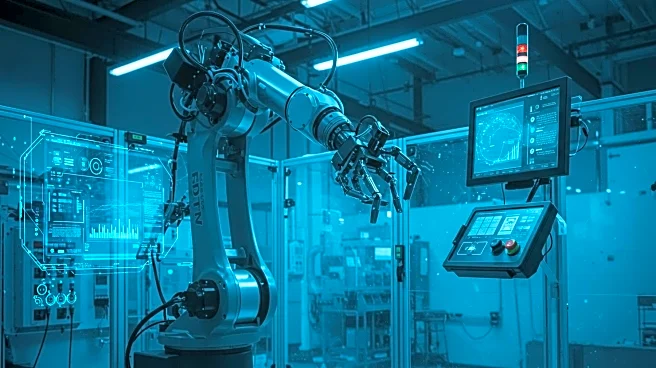What's Happening?
Predictive maintenance, powered by artificial intelligence, is revolutionizing the way robotic systems are managed in manufacturing and logistics. This approach uses real-time sensor data to forecast equipment failures before they occur, offering a dynamic alternative to traditional maintenance strategies. By analyzing massive volumes of sensor data, AI models can detect early signs of wear or performance drift in robotic components, allowing operators to intervene before a breakdown happens. This method reduces maintenance costs and unplanned interruptions, ensuring continuous operation of robotic systems. Companies like Bosch Rexroth, Siemens, and GE Digital are leading the way in providing AI-driven predictive maintenance solutions tailored to industrial environments.
Why It's Important?
The implementation of AI-driven predictive maintenance is crucial for industries reliant on robotic systems, as it minimizes unplanned downtime and optimizes maintenance scheduling. This not only saves labor and operational costs but also extends the lifespan of equipment, protecting capital investments. In a competitive market, reducing disruptions can be the difference between meeting production targets or missing deadlines. Furthermore, predictive maintenance enhances safety by preventing catastrophic mechanical failures. However, challenges such as data readiness, system integration, and cybersecurity concerns must be addressed for successful deployment.
What's Next?
The future of predictive maintenance is closely tied to advancements in AI and robotics. Emerging techniques like federated learning may allow companies to improve AI models without sharing raw data, enhancing security and intelligence. Digital twins and edge AI are expected to play significant roles, enabling real-time analysis and simulation-based diagnostics. As robotic systems become more autonomous, they may eventually coordinate repairs with other machines, moving towards fully autonomous industrial ecosystems.
Beyond the Headlines
The adoption of predictive maintenance raises ethical and legal considerations, particularly regarding data privacy and cybersecurity. As AI models become more sophisticated, ensuring the protection of sensitive data and maintaining transparency in AI decision-making processes will be essential. Additionally, the shift towards autonomous systems may impact workforce dynamics, necessitating new skills and training for industrial teams.










